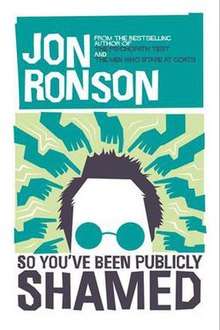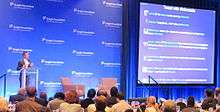So You've Been Publicly Shamed
So You've Been Publicly Shamed is a 2015 book by British journalist Jon Ronson about online shaming and its historical antecedents.[2] The book explores the re-emergence of public shaming as an Internet phenomenon, particularly on Twitter. As a state-sanctioned punishment, public shaming was popular in Colonial America. Between 1837 in the UK and 1839 in the US, it was phased out as a punishment, not due to the increasingly populous society, as was widely held,[3][4] but instead in response to rising calls for compassion.[5]
 Cover of the trade-paperback | |
| Author | Jon Ronson |
|---|---|
| Genre | Current events, Popular sociology |
| Publisher | Riverhead Books (US), and Pan Macmillan (UK) |
Publication date | 31 March 2015 (US)[1] and 3 September 2015 (UK)[2] |
| Media type | Print (Hardcover and Paperback) |
| Pages | 304 (first edition, hardback)[1] |
| ISBN | 978-1-59448-713-2 |
| OCLC | 893974244 |
In gathering material for his book, Ronson interviewed several individuals who were on the receiving end of concentrated Internet shaming, including Jonah Lehrer, Justine Sacco, and Lindsey Stone.[6] He also interviewed controversial practitioners of 21st century public humiliation, including former Texas District Judge and current congressional representative Ted Poe,[7] and several instigators of widespread public shamings[8].
Content
In the introduction, Ronson relates a story of an automated parody Twitter handle, @jon_ronson (Ronson's twitter username is actually @jonronson). The account posts a smattering of food and party-related tweets, none of which are related to the content of the actual Jon Ronson's life.[9] This leads to Ronson asking the bot's creators for its removal, as he believes it to be a spambot. The creators of the account call it an "infomorph", and decline Ronson's request, but eventually agree to meet in person with the author.[10]
Ronson then records the interaction and posts it on YouTube,[11] and is surprised when the reaction is overwhelmingly in his favor. The creators of the spambot, in the wake of the public shame elicited by Ronson's video, finally agree to retire the counterfeit Twitter account.[12]
This experience leads Ronson to re-evaluate other public shamings he's participated in, and the effects these shaming events have on both the shamed and the shaming. He begins by interviewing prominent victims of public shaming on the Internet, and the instigators of these shaming events.

His first subject is Jonah Lehrer, disgraced popular science journalist for The New Yorker and author of the book Imagine: How Creativity Works. Ronson also interviews the journalist who exposed Lehrer's plagiarism and misuse of quotes—Michael C. Moynihan. In the days preceding Lehrer's televised apology at a conference held by the John S. and James L. Knight Foundation, Ronson interviews the disgraced journalist while hiking through Runyon Canyon. The public humiliation inherent to Lehrer's apology speech is exacerbated by a large projector screen hung behind his speaking podium and a small television screen viewable to Lehrer, which both display a live Twitter feed of any individual tweeting with the hashtag "infoneeds".[13][14] A small controversy brews as a result of Lehrer's speech's content, which some describe as arrogant and lacking sincerity. Ronson, who had recently interviewed Lehrer and was asked for thoughts on a draft, admits to having decided not to say to Lehrer before he made the speech that he found it unconvincing. Further social media upheaval occurs when it is discovered that the Knight Foundation paid Lehrer $20,000 for his apology speech.[15]
His next subject is Adria Richards, who publicised the faces of two tech developers at PyCon who were whispering sexual jokes to one another during a lecture on facilitating women's involvement in tech. One of the developers (named only as "Hank" in the book) publicly attributed his resultant dismissal from his job on Richards' publicizing his behavior, which he felt had been harmless. His account of events led to an online backlash against Richards that in turn led to Richards herself being let go from her job. Ronson reveals that at time of writing, both men had been able to find new positions in tech in the following months, whereas Richards remained unemployed and continued to face online threats and harassment in relation to the incident. Richards says she believes Hank is responsible for knowingly instigating her sustained harassment and continued unemployment, due to his publicly blaming her for his own firing, but Ronson ultimately suggests he feels Richards is primarily at fault.[16]
Other sections in the book include interviews and coverage of the Justine Sacco incident[17] and a long section about how people can "hide" their negative Google Search results via legal and creative IT mechanics.
Reception
Response to So You've Been Publicly Shamed has been mostly positive. As of August 2016, the book has an average score of 3.9/5 on Goodreads with almost 20,000 total ratings.[18]
Jennifer Latson of The Boston Globe remarked that "Ronson manages to be at once academic and entertaining."[19] Matthew Hutson from The Wall Street Journal stated that the book "raises interesting questions about righteousness, reputation and conformity" but lamented that Ronson's "thoughts remain disconnected musings rather than cohering as a calculus of public shaming's costs and benefits".[12]
See also
- "Hated in the Nation", a 2016 episode of the anthology series Black Mirror, was partly inspired by So You've Been Publicly Shamed.[20]
- Cancel culture
References
- "So You've Been Publicly Shamed". Retrieved 7 April 2015.
- "So You've Been Publicly Shamed". Picador Publishing. 2015. Retrieved 6 April 2015.
- Beato, Greg (22 June 2013). "The Shame of Public Shaming". Reason.com. Retrieved 7 April 2015.
- Eaton, Marqus (March 1916). "Punitive Pain and Humiliation". Journal of the American Institute of Criminal Law and Criminology. 6 (6). JSTOR 1133114.
- Ziel, Paul. "Eighteenth Century Public Humiliation Penalties in Twenty-First Century America: The "Shameful" Return of "Scarlet Letter" Punishments in U.S. v. Gementera" (PDF). BYU Journal of Public Law. 19 (499): 501. Archived from the original (PDF) on 13 May 2014.
- Rife, Katie (30 March 2015). "Jon Ronson dives into the Internet's deep end in So You've Been Publicly Shamed". A.V. Club. Retrieved 7 April 2015.
- Dean, John (20 March 2015). "Is Shame Necessary? How About Public Shaming?". Justia (Verdict Blog). Retrieved 7 April 2015.
- "Public Shaming Law and Legal Definition | USLegal, Inc". definitions.uslegal.com. Retrieved 3 April 2019.
- Ronson, Jon (21 February 2015). "'Overnight, everything I loved was gone': the internet shaming of Lindsey Stone". The Guardian. Retrieved 6 April 2015.
- Poole, Steven (5 March 2015). "So You've Been Publicly Shamed review – Jon Ronson on rants and tweets". The Guardian. Retrieved 7 April 2015.
- Ronson, Jon (22 March 2012). "009 JON VS JON Part 2 Escape and Control". Escape and Control. Retrieved 6 April 2015.
- Hutson, Matthew (27 March 2015). "Smartphone Vigilantes". Wall Street Journal. Retrieved 7 April 2015.
- Engber, Daniel (31 March 2015). "Were We Too Hard on Jonah Lehrer?". Slate. Retrieved 7 April 2015.
- Hu, Elise (12 February 2013). "In first public comments since plagiarism scandal, Jonah Lehrer blames "arrogance, need for attention" for lies". The Knight Foundation. Retrieved 7 April 2015.
- Chotiner, Isaac (14 February 2013). "The Real Trouble with Jonah Lehrer". The New Republic. Retrieved 7 April 2015.
- Silverman, Jacob (6 April 2015). "After Outrage". Slate. Retrieved 7 April 2015.
- Ronson, Jon (20 December 2015). "Jon Ronson: how the online hate mob set its sights on me". The Guardian. Retrieved 21 July 2020.
- "So You've Been Publicly Shamed". Goodreads. 1 August 2016. Retrieved 1 August 2016.
- Latson, Jennifer (31 March 2015). "'So You've Been Publicly Shamed' by Jon Ronson". The Boston Globe. Retrieved 7 April 2015.
- "'Black Mirror': Showrunner Explains Season 3 Endings". EW.com. Retrieved 30 April 2018.
External links
- Jon Ronson interviews the creators of the confederate twitter account.
- Jon Ronson interviewed about the book on the podcast On the Media.
- "Book Discussion on So You've Been Publicly Shamed". C-SPAN. 1 April 2015. Retrieved 2 May 2015.